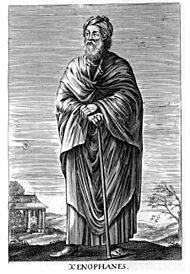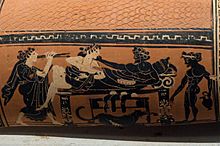Xenophanes facts for kids
Quick facts for kids
Xenophanes
|
|
|---|---|

Fictionalized portrait of Xenophanes from a 17th-century engraving
|
|
| Born | c. 570 BC Colophon, Ionian League
(modern-day Değirmendere, İzmir, Turkey) |
| Died | c. 478 BC (aged c. 92) |
| Era | Pre-Socratic philosophy |
| Region | Western philosophy |
|
Main interests
|
Social criticism Kataphasis Natural philosophy Epistemology |
|
Notable ideas
|
Religious polytheistic views as human projections The cosmic principles of water and earth The true belief and knowledge distinction |
|
Influences
|
|
|
Influenced
|
|
Xenophanes of Colophon (/zəˈnɒfəniːz/; Ancient Greek: Ξενοφάνης ὁ Κολοφώνιος [ksenopʰánɛːs ho kolopʰɔ̌ːnios]; around 570 – 478 BC) was an Ancient Greek philosopher, thinker about gods, poet, and critic. He was born in Ionia (modern-day Turkey). He traveled a lot across the Greek-speaking world in early ancient times.
Xenophanes was known for his critical way of writing. He wrote poems that are thought to be some of the first satires. Satires are writings that use humor or exaggeration to criticize people's foolishness or mistakes. He also wrote poems that criticized his society's traditional ideas. These included too much focus on wealth, over-the-top parties, and athletic wins. He also criticized famous poets like Homer for making the gods seem foolish or weak. We only have small pieces of his poems today. These pieces survived because other philosophers quoted them later.
Xenophanes is seen as one of the most important early Greek philosophers. He was a very original thinker. He tried to explain natural things like clouds or rainbows without using myths or gods. Instead, he looked for basic reasons or "first principles." He also thought about the difference between knowing something for sure and just believing it. This was an early step in the study of epistemology, which is about how we know what we know.
Life of Xenophanes
The ancient writer Diogenes Laertius said that Xenophanes was born in Colophon. This was a city in Ionia, which is now part of Turkey. Laertius wrote that Xenophanes was active around 540–537 BC. Most modern experts believe he was born around 570-560 BC.
Xenophanes himself said that he left his home at age 25. He then lived for 67 years in other Greek lands. This means he lived to be at least 92 years old. He was a traveling poet, moving from place to place. We don't know much else about his family or personal life.
Later ancient stories sometimes linked Xenophanes to the city of Elea in Italy. Some said he wrote a poem about founding that city. Others thought he started the Eleatic school of philosophy or taught Parmenides. Some even linked him to Pythagoreanism. However, most modern experts don't think these links are true.
Who influenced Xenophanes?
Xenophanes' writings mention other thinkers like Thales, Epimenides, and Pythagoras. Later, Heraclitus and Epicharmus mentioned Xenophanes in their own works.
Xenophanes' Poems

We know about Xenophanes' ideas from small pieces of his poems. These pieces were quoted by later Greek writers. Unlike some other early philosophers who wrote only one main work, Xenophanes wrote many different poems. We can't even be sure which fragments belong to which poem.
According to Diogenes Laertius, Xenophanes wrote a long poem about the founding of Colophon and Elea. It had about 2000 lines. Other old writings suggest his collection of satires had at least five books. Many later sources said he wrote a poem called "On Nature." However, modern experts doubt this title. It was probably a name given by librarians to works by philosophers who studied nature.
His Satires and Criticisms
Xenophanes' satires were sometimes called Silloi. This name might have come from Xenophanes himself. Or it might be because the philosopher Timon of Phlius (who wrote satires) often put his criticisms into Xenophanes' mouth.
Xenophanes' writings show a sense of doubt or skepticism. This way of thinking became more common later. He especially criticized the religious ideas of earlier Greek poets and people of his time. He aimed his critique at the belief in many gods.
His poems criticized many ideas. These included the works of Homer and Hesiod. He also criticized the belief in gods that looked and acted like humans. He also made fun of how Greeks honored athletes so much.
Xenophanes' Philosophy
Xenophanes is now seen as a very original and important philosopher. He was a social critic who wrote poems about how people should behave at parties. He also criticized how much society praised athletes. Xenophanes wanted to change how people understood gods. He questioned Greek myths told by Hesiod and Homer. He wanted ideas about gods to fit better with what was considered respectful in Ancient Greek religion.

He offered natural explanations for things like clouds and rainbows. He didn't use myths. He said that traditional religious ideas were just human projections. This means people made gods in their own image. As an early thinker in epistemology, he separated the ideas of knowledge and belief from truth. He thought only the gods could truly know the truth.
Social Criticism
Xenophanes wrote poems about how to act properly at a symposium. These were Ancient Greek parties held to celebrate victories or welcome young men into society. His surviving poems emphasize the importance of being respectful and honoring the gods at these gatherings.
Understanding God
Xenophanes believed that "God is one, supreme among gods and men." He said God is not like humans in body or mind. He thought there was one greatest God. This God is eternal and is like a perfect mind or thought. This God moves everything but does not look like humans. Xenophanes was not saying there was no God. Instead, he was criticizing how ancient Greek writers thought about God.
Xenophanes had five main ideas about God:
- God is beyond human ideas of right and wrong.
- God does not look like a human.
- God cannot die or be born; God is eternal.
- There is no ranking or hierarchy among gods.
- God does not get involved in human daily life.
Explaining Nature

Xenophanes believed God was separate from human affairs. This led him to find natural explanations for physical events.
He was probably the first philosopher to explain St. Elmo's fire. This is a glow seen on ship masts during thunderstorms. He thought the glow came from small cloud droplets moving around. This was a very unique idea for his time.
In Xenophanes' view of the universe, the Earth goes down forever. It also stretches infinitely in every direction. Because of this, he thought the sun and moon didn't go *under* the Earth at night. Instead, he believed a new sun or moon was formed each day. This meant the sun and moon were a "type" of object that appeared in the sky, not the same single object every day.
Xenophanes found fossils of sea creatures on land. From this, he concluded that water must have once covered all of the Earth. He thought the universe had a basic principle: a constant flow between wet and dry, or earth and water. These two states would switch back and forth. When they switched, human life would disappear and then come back. This idea of changing states and life returning suggests he believed in cause and effect. This was a big step away from old myths and towards scientific observation.
What is Knowledge?
Xenophanes believed that truth about reality exists. However, he thought humans, being mortal, could not fully know it. This idea made him an early thinker in philosophical skepticism. He also was one of the first to tell the difference between a true belief and actual knowledge. He thought you could believe something was true without truly knowing it.
He wrote:
Yet, with respect to the gods and what I declare about all things.
No man has seen what is clear nor ever will any man know it.
Nay, for e’en should he chance to affirm what is really existent,
He himself knoweth it not ; for all is swayed by opining.
Because we only have pieces of his work, it's hard to fully understand his ideas. He might have meant that true knowledge is deeper than what we see. He also thought that having the most and widest variety of evidence was the best way to prove an idea.
Xenophanes' Legacy
Ancient writers like Aristotle and Plutarch described Xenophanes' ideas as believing in one God (monolatrous) or that God is everything (pantheistic). Aristotle said that for Xenophanes, "the All is God." God has the power to act immediately and use his mind effectively.
Some people see Xenophanes as an early supporter of monotheism (belief in one God) in Western philosophy. This is because he talked about "one god greatest among gods and men." However, this quote also mentions multiple "gods" that the supreme God is greater than. The philosopher Karl Popper saw Xenophanes as an early example of critical rationalism. This idea says we can only act based on working hypotheses. We can act as if we know the truth, but we should know that it's very unlikely we know it perfectly.
See also
 In Spanish: Jenófanes para niños
In Spanish: Jenófanes para niños
 | George Robert Carruthers |
 | Patricia Bath |
 | Jan Ernst Matzeliger |
 | Alexander Miles |

